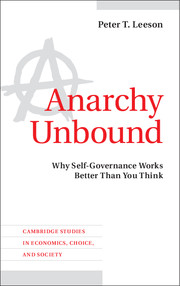Book contents
- Frontmatter
- Dedication
- Contents
- Acknowledgments
- 1 Anarchy Unbound
- Part I Self-Governance and the Problem of Social Diversity
- Part II Self-Governance and the Problem of Violence
- Part III Self-Governance and the Problem of “Bad Apples”
- Part IV Self-Governance as Superior to the State
- 8 Efficient Anarchy*
- 9 Better Off Stateless*
- 10 An Argument for Anarchy in LDCs*
- 11 A Future for Thinking about Self-Governance*
- References
- Index
8 - Efficient Anarchy*
Published online by Cambridge University Press: 05 February 2015
- Frontmatter
- Dedication
- Contents
- Acknowledgments
- 1 Anarchy Unbound
- Part I Self-Governance and the Problem of Social Diversity
- Part II Self-Governance and the Problem of Violence
- Part III Self-Governance and the Problem of “Bad Apples”
- Part IV Self-Governance as Superior to the State
- 8 Efficient Anarchy*
- 9 Better Off Stateless*
- 10 An Argument for Anarchy in LDCs*
- 11 A Future for Thinking about Self-Governance*
- References
- Index
Summary
Can anarchy be efficient? Conventional wisdom unequivocally answers no. By providing monopolized social-rule creation and enforcement, government enables individuals to realize gains from cooperation they couldn't capture without it. Given the choice, welfare-maximizing persons therefore choose to form government. As Nobel Prize–winning economist Douglass North (1981: 24) puts it: “Throughout history, individuals given a choice between a state – no matter how exploitative it might be – and anarchy, have decided for the former.”
The ubiquity of government today makes it easy to forget that numerous societies were stateless for most of their histories and that some remained so well into the twentieth century. Several of these societies encompassed many people. Consider, for instance, African groups such as the Tiv, which included more than one million individuals, the Nuer whose population has been estimated at 400,000, or the Lugbara with more than 300,000 members. More striking yet is the fact that, globally, the world has always been, and continues to be, in international anarchy.
- Type
- Chapter
- Information
- Anarchy UnboundWhy Self-Governance Works Better Than You Think, pp. 155 - 169Publisher: Cambridge University PressPrint publication year: 2014



